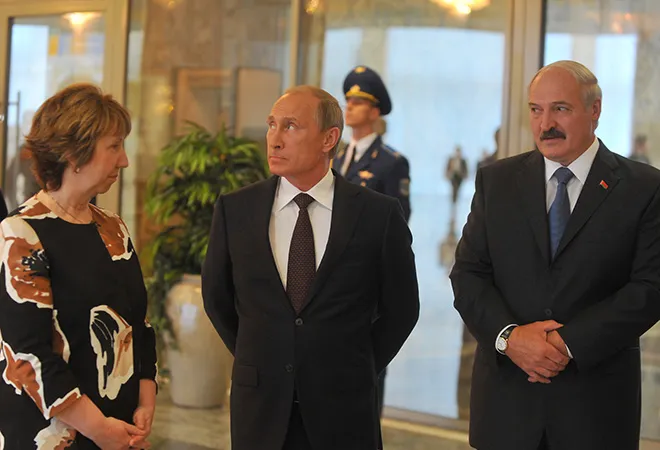-
CENTRES
Progammes & Centres
Location

Russian President Vladimir Putin on 27 August revealed that ‘a reserve group of law enforcement personnel’ had been created for intervention in Belarus at the request of President Alexander Lukashenko. This would be in case ‘the situation becomes uncontrollable, when extremist elements starts plundering the country.’ For the past three weeks, large-scale protests and mass strikes have spread across Belarus against what the opposition alleges to be a fraudulent presidential election giving Lukashenko 80 percent of the vote, furthering his 26-year old rule.
While the readiness of Russia to extend assistance under Collective Security Treaty Organisation (CSTO) had already been noted in a phone call between Lukashenko and Putin last week, this was the first time the formation of a special contingent for Belarus has been revealed. At the same time, Putin also noted the constitutional court ruling against setting up of ‘supra-constitutional bodies,’ in a reference to the Coordination Council set up by the opposition headed by Svetlana Tsikhanouskaya, aiming to strike a deal for a transfer of power.
Till now the Russian support of Lukashenko had been more subtle, but these statements are clearly a ‘step-up’ in terms of the framing of the situation. This entails a more visible backing of Lukashenko even though Putin added that people on the streets cannot be ignored. Whether Russia will intervene militarily in Belarus or not remains a moot point at the moment but the implications of any such future move are already being debated. It must be noted that till now, the Belarussian protests have been distinctly neutral – with the agenda firmly on domestic issues combined with a steadfast refusal to adopt either a pro-Russia or a pro-West position. In fact, Tsikhanouskaya has gone on record to state that the ongoing protests are not a ‘geopolitical revolution’ and not in opposition to either Russia or the West.
Whether the latest announcement by Putin is a way to send a message across to the EU/US to not try to intervene in Belarus – if it wants to see a resolution without active Russian intervention – or a way to assert its strategic influence, the results of such posturing might prove counter-productive in the future. This is primarily because issuing such ultimatums raises the risk of alienating an opposition that has consistently steered clear of choosing geopolitical sides till now. Also, given that the EU is already pressurizing Lukahsenko by talking about expanded sanctions, he is less likely to push away Russia at the same time. Thus, the Kremlin can afford not to make grand declarations in the public sphere in support of the incumbent even if it does so privately.
This is not to deny the deep strategic relevance Belarus has for Russia, making the latter an interested party. As experts have pointed out, it occupies a key position between the EU and Russia, ensuring the interest of both sides in the ongoing developments. About 50 percent of Belarus’ goods trade was with Russia in 2019, with the EU coming in at second position with a share of 20 percent. Most of its energy is also imported from Russia and the terms of trade have in recent years formed a bone of contention in bilateral ties. It is important for transit of Russian gas transit to Western Europe. But in recent years, the two sides have diverged over issue of subsidies and Belarus’ reluctance to implement the creation of the Union State. However, despite several disputes and efforts by Minsk to improve relations with both the US and the EU, Russia remains its key partner.
The current situation in Belarus bears more resemblance to the change of power in Armenia through popular protests in 2018 and less to the 2014 Ukrainian protests and the subsequent ousting of President Viktor Yanukovych. Armenia – much like Belarus – is a member of EAEU and CSTO, with Russia being its leading trade partner. In 2018, as the opposition leaders in Yerevan called for regime change, they clearly declared their intent to not turn away from Moscow after taking charge. It was reported that Russia was in contact with the top opposition leadership as well as the ruling party to ensure that the agenda remained focused on domestic events.
This meant not only that when opposition leader Nikol Pashynin came to power an immediate contact was established at the highest level, but also that the geopolitical status quo was maintained. A key factor in this was also recognition among Armenian leaders about their deep dependence on Russia that ruled out any adventurism in determining future policy.
Like in the case of Armenia, a close dependence on Russia makes any clean break not a very viable option – for either Lukashenko or the opposition. It is hard not to see the similarities with Belarus where the symbols of the protest (flag, slogans) have concentrated attention on domestic concerns of the people. This presents a stark contrast to the events in Ukraine where the Maidan protestors expressed a clear desire for a West-oriented policy.
While it is likely that the opposition would pursue a more balanced foreign policy if it takes power but if alienated by Russia, this might turn into an overt pro-West approach that would be a loss for the Kremlin. As a result, Moscow might consider taking a less heavy-handed approach in the matter, unless there is an overt threat of Minsk slipping out of its geopolitical orbit. It must also remember that despite its success in Crimea, Russia now has to contend with a Ukraine that has turned to the West, the very outcome it set out to prevent.
Given that the future of Belarus still remains unclear, quiet back channels and engagement with all parties to ensure a favourable standing for Russia in the future might be a more profitable endeavour – a la Armenia in 2018. There is also a suggestion that if west restrains itself from overt intervention, it would evince a similar response from Russia. Some have even suggested that the EU and Russia should seek to cooperate in order to avoid a ‘zero-sum scenario’.
The reaction to events in Armenia has demonstrated that Russia does not see every single discontent against leaders in its neighbourhood as a colour revolution or a western conspiracy. Whether it eventually takes a similar view of the situation in Belarus or not remains ambiguous at the moment. As long as its strategic national interests are not harmed, there remains a possibility that Russia will not resort to use of force. In any scenario, a more balanced, careful policy by Russia is the need of the hour if it is to ensure sustained good relations with Belarus in the future – irrespective of the leadership that eventually takes charge of its neighbour.
The views expressed above belong to the author(s). ORF research and analyses now available on Telegram! Click here to access our curated content — blogs, longforms and interviews.

Nivedita Kapoor is a Post-doctoral Fellow at the International Laboratory on World Order Studies and the New Regionalism Faculty of World Economy and International Affairs ...
Read More +